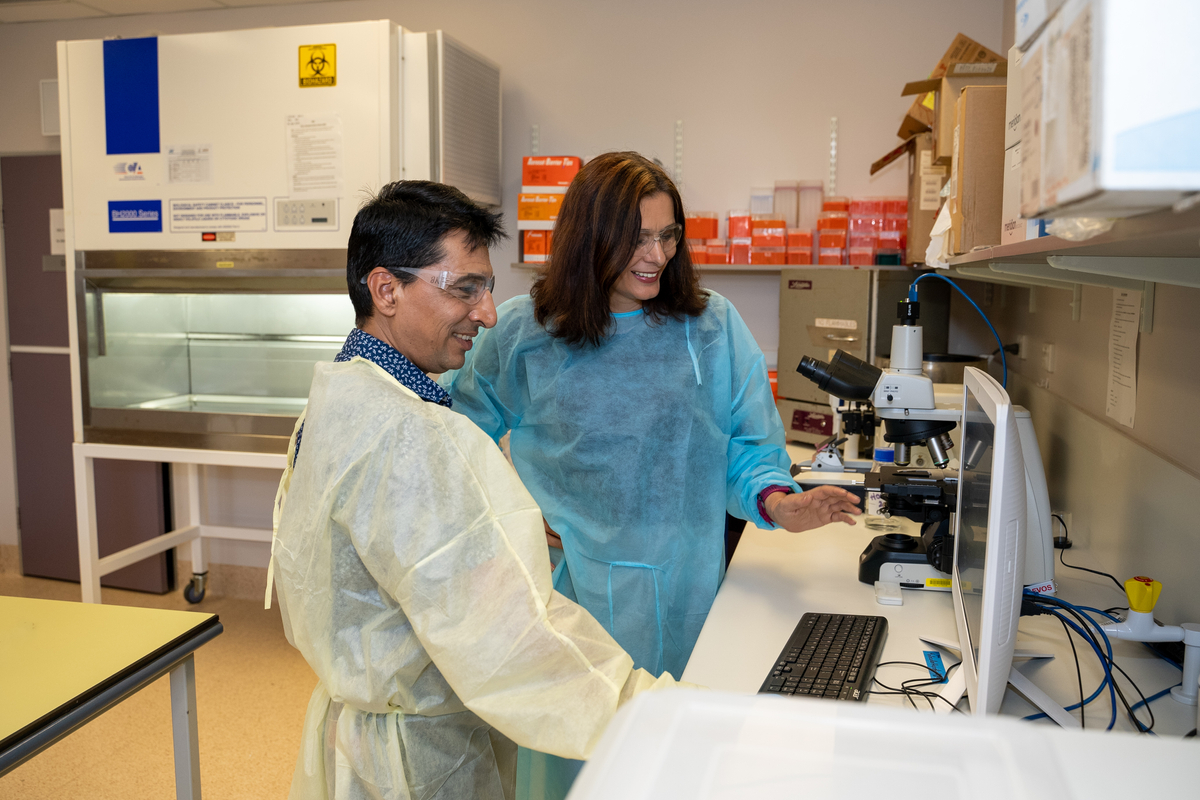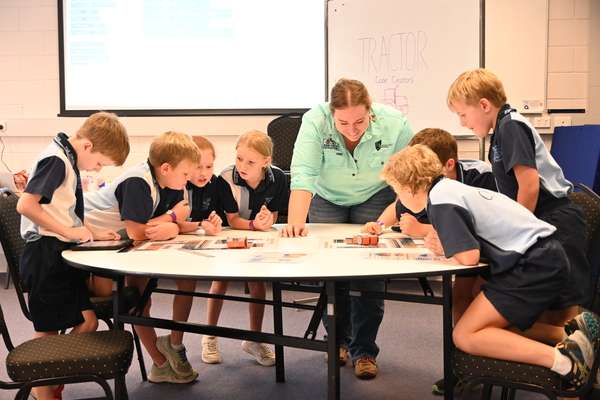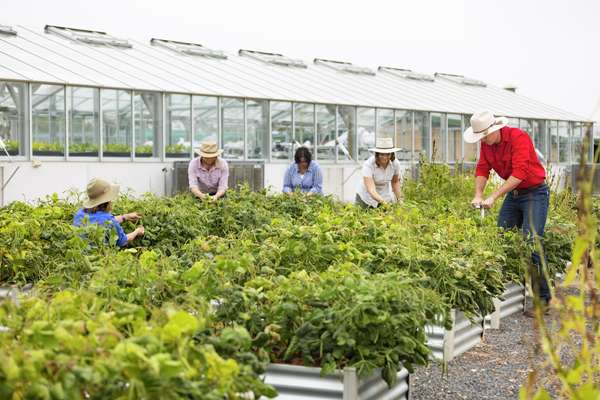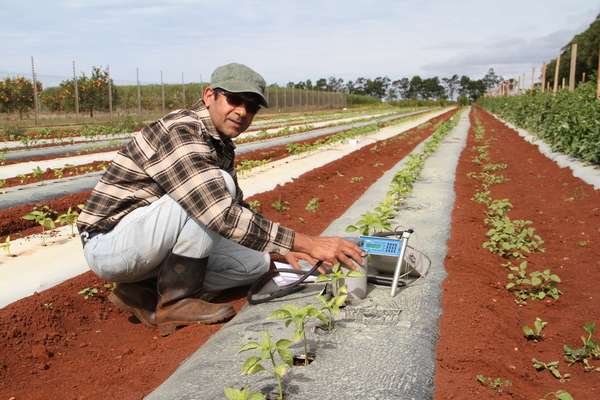
Their research addresses global challenges such as antimicrobial resistance (AMR) by exploring the complex interactions between gut microbes and animal wellbeing. A key focus is the development of next-generation probiotics and microbiome-based strategies to reduce reliance on antibiotics. The team conducts research both in the lab and through on-farm trials under full production conditions, ensuring outcomes are practical, scalable, and relevant to industry needs. Through their work, the team is advancing agricultural science and supporting the long-term resilience of farming communities.

Our research explores the vital role of gut microbiota in livestock health and productivity, with a focus on poultry. From next-generation probiotics to strategies that reduce reliance on antimicrobials, our projects are helping shape more sustainable and resilient farming systems.
Enterococcus cecorum (EC) is an emerging bacterial pathogen of broiler chickens worldwide, causing substantial economic loss. The pathogen affects the skeletal system, leading to lameness and paralysis.
The team is using cutting-edge DNA sequencing technologies and AI-assisted data analysis to study EC outbreaks on commercial poultry farms. Their research aims to uncover how these infections arise and spread, how EC interacts with other bacteria, and how environmental factors such as feed supplements influence disease severity.
By identifying coinfection patterns and risk factors, this work will contribute to improved poultry health, animal welfare, and the development of more effective prevention and treatment strategies for the industry.
This national research consortium is transforming poultry nutrition by developing sustainable, precision feeding strategies for broiler chickens in Australia. Led by a team of researchers from multiple universities and industry partners, the project aims to reduce reliance on imported ingredients like soybean meal by exploring locally sourced alternatives and smart nutrition technologies.
The CQU team leads a key project component focused on shaping a healthy gut microbiota in chickens. This involves seeding the gut early with beneficial bacteria and nourishing it through tailored feeding strategies that support gut health, reduce harmful pathogens, and minimise the need for antibiotics. Outcomes will include new nutrition programs that support healthier chickens, reduced environmental impact, and improved productivity across the poultry sector.
This research project explores how to improve gut health and productivity in chickens by modulating the function of their intestinal microbiota. Using a proprietary precision glycan, a targeted carbohydrate compound, the team aims to influence microbial activity in the gut, promoting a healthier intestinal environment. By understanding and guiding microbial functions, this study supports more efficient poultry production and animal welfare through innovative, science-driven strategies.
Pasture dieback is a natural crisis affecting grazing land across Queensland, severely impacting livestock production and increasing soil erosion.
First observed in buffel grass, the condition now affects a range of tropical and subtropical grasses. This research project investigates the role of the soil microbiome in dieback recovery and the restoration of soil microbial functions.
The findings aim to provide sustainable, nature-based solutions to restore damaged pastures and support the resilience of Queensland's grazing systems.
This research project focuses on developing and testing next-generation probiotics to enhance gut health, productivity, and sustainability in poultry production. Researchers use both laboratory (in vitro) and live bird (in vivo) experiments to identify and evaluate beneficial bacterial strains, selecting the most effective candidates.
The project also investigates the combined effect of probiotics and feed enzymes, aiming to further improve nutrient digestion, bird performance, and gut function. These precision probiotic strategies are designed to reduce reliance on antibiotics and support a more resilient poultry industry.
Our team brings together expertise in microbiology, animal health, and sustainable agriculture. Working closely with industry, we translate laboratory insights into real-world outcomes that support resilient farming systems.
Professor Dana Stanley was awarded a PhD in Molecular Microbiology from Victoria University, Melbourne, 2009. Following graduation, she started a postdoctoral position in CSIRO’s Animal Health Laboratories (AAHL), in poultry intestinal health research. Dana specialised in gut microbiota and genetics during her time at AAHL.
She moved to CQUniversity in 2013 and is now a leader of the Molecular Microbiology and Poultry Health research cluster in the Institute for Future Farming Systems, focusing on human and livestock intestinal health and nutrition, probiotics, next-generation antibiotics development and pathogen control.
Dana is also investigating the ways to reduce and control antimicrobial resistance on farms. She recently started working on pigs’ microbiota as well. Several of Dana’s projects are running directly on farms under full production conditions. Majority of her publications are in the world’s top 10% journals and among 10% most cited in the world. Dana is very passionate about nature conservation, animal ethics, exercise and nutrition.
Dr. Yadav Bajagai is a researcher at CQU, specializing in microbiome, genomics, gut health, animal nutrition, and bioinformatics. He holds a Bachelor of Veterinary Science, a Master’s Degree in Animal Science and a PhD from the University of Queensland. He has extensive experience in various roles across industry, government, and academia. His current research interests include host-microbe interaction, gut health, alternatives to antibiotic feed supplements, antibiotic resistance, and microbial ecology. He is also passionate about big data analysis and bioinformatics. Dr Bajagai has co-authored more than 50 scientific papers, including more than 30 journal articles in reputable publications.
Prior to his research career, he served in the Ministry of Agriculture in Nepal as a Senior Veterinary Officer, working on livestock extension, animal health, and food and nutrition security. He has also consulted for the livestock and poultry industry as a veterinarian. Dr. Bajagai's expertise extends to his role as a consultant for the Food and Agriculture Organisation of the United Nations (FAO), where he focused on the use of probiotics in animal nutrition and their regulation.
Throughout his career, Dr. Bajagai has received numerous national and international awards for his academic and professional achievements. He was honoured with the prestigious Australian Leadership Award (ALA) and Endeavour Award for his Master's and PhD studies in Australia. A research and extension project led by Dr. Bajagai's team, on behalf of the government of Nepal, was awarded a USD 58 million grant from the Global Agriculture and Food Security Program (GAFSP). He was also recognized with the Outstanding Young Australian Alumni Award by the Australian Trade Commission and Australia Future Unlimited, the "Mahendra Vidya Bhusan" (The Order of Merit in Education) by the King of Nepal, and the "Nepal Vidya Bhusan" (Order of Merit) by the President of Nepal, among other accolades.
Driving adoption of new farming practices and technologies by changing the way end-users engage with information by combining innovative methods of education, behavioural psychology and mass communications.

The Precision Cropping Systems cluster delivers applied research, training, and industry partnerships to boost productivity and sustainability in northern Australian agriculture.

CQUniversity’s Precision Horticulture team is focussed on improving the productivity and profitability of Queensland’s major horticultural commodities.

CQUniversity Australia is a trading name of Central Queensland University
ABN: 39 181 103 288
RTO Code: 40939
CRICOS: 00219C
TEQSA: PRV12073